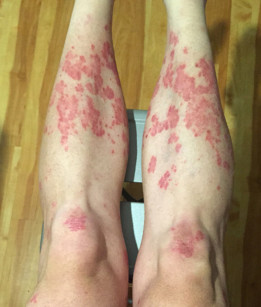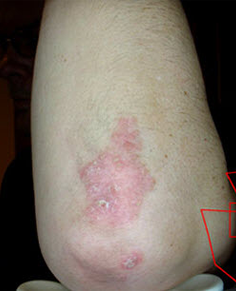Psoriasis
PSORIASIS
Psoriasis is a partially hereditary skin condition with intermittent attacks which may be triggered by additional environmental or nutritional factors or by mental stress. An appropriate skin care may relieve its symptoms.

.jpg)
The estimates on psoriasis cases in Germany slightly differ, however, they can generally be settled between 1-2 and 2-3 per cent. With a share of 0.3 per cent, children are less affected, i.e. the disease frequently manifests after the age of twenty. Although Psoriasis is not listed among today’s typical complaints there may be diagnosed more cases than in the past. Psoriasis was already described in the antique literature. There is no danger of infection but the disease can be transmitted within the family.
Therapies
A specific feature of psoriasis is a very fast migration of the skin cells (keratinocytes) from the basal layer to the horny layer. Also the cell division is considerably more accelerated than in normal skin which leads to miscellaneous erythemas on the body parts affected which are covered with scales. The scales show a typical silvery-white surface. Elbows, knees, coccyx and scalp but also the nail bed are affected. Frequently, the itching which may be observed consequently leads to scratching and further on to characteristic bleedings in form of minute dots. Depending on the specific efflorescence and the body parts affected, different types of psoriases are diagnosed.
The medical treatment today includes a series of different therapies of which a small selection will be presented in the following:
Salicylic acid, urea, and sea salt remove the scales. Tar products and corticosteroids like cortisone prevent inflammations. Cignolin (dithranol; ‘minute therapy’), Vitamin D3-like substances and retinoids (e.g. vitamin A-acid) slow down the excessive cell division. Ciclosporin A has immunosuppressive effects. Salt water bathes (Dead Sea) and an appropriate dosage of sun exposure respectively UV-ray treatment or psoralens (photosensitizing substances) and UV-ray treatment often are used in combination. A more recent therapy is a treatment with fumaric acid or esters of the fumaric acid (for oral use) which originates in the traditional folk medicine. Fumaria (Latin: fumaria officinalis), a plant which belongs to the papaveraceae family contains fumaric acid and has been used for quite some time as an appropriate substance to cure skin diseases. However, it is recommended to use this therapy with due care and supervision as e.g. cignolin may cause protracted dermatoses on healthy skin. Cortisone though has a high relapse potential after stopping the treatment. Vitamin D3 related products influence the calcium balance of the body. In case of retinoid therapy, younger women are recommended to strictly stay on contraception for an extended period of time.
Cosmetic consultation
Whenever the cosmetician is confronted with a psoriasis case, she has to accept the fact that a dermatological treatment cannot be part of her cosmetic service.
On the other hand, however, a psoriatic skin needs adequate skin care. Thus, the cosmetician on her part can contribute a major share to an appropriate application of dermatological useful products for the care of the healthy skin parts as well as for the supportive prevention.
It is more and more realized that quite a few of the additives generally used in cosmetic products are not suitable for the care of a skin susceptible to psoriasis:
The preservatives listed in the appendix of the Kosmetikverordnung (German Cosmetic Decree) may cause undesirable skin sensitizations due to the disordered skin barrier. Perfumes generally consist of a multitude of different and undeclared components and also have an allergenic potential. Due to their highly occlusive properties, mineral oils slow down the endogenic regeneration capacity of the skin when applied in high dosage. Emulsifiers and especially the widely used ethoxylates may cause disorders within the skin barrier layers.
Psoriasis attacks may be provoked by a contact with non-physiological substances which is another important reason for avoiding additives and reducing the components to only a few basic substances. It is also recommended to pay close attention to the list of ingredients (INCI).
On the other hand, however, also endogenic substances as e.g. dried perspiration may irritate the skin. As a consequence, clothing generally should be light and breathing. Furthermore, any materials which may increase the itching as e.g. wool or impregnated fabrics should be avoided.
Products for skin care and cleansing
Unnecessary cosmetic products should be avoided in the first place. Regarding skin cleansing, highly degreasing soaps and above all, liquid soaps with surface-active re-fattening agents are definitely not recommended. In exchange for it, irritant-free oil bathes are suggested.
Experience has shown that lotions with liposomal structure containing fumaric acid are a good recommendation.

Providing sufficient oil-based nutrients
Regarding the daily skin care special attention has to be paid to supply the skin with a sufficient amount of fatty substances which can either be achieved with pure oil products or emulsions.
However, when using emulsions it should be kept in mind, that emulsifiers may show counterproductive effects just like cleansing products. It is recommended to use creams which contain water and oil and eventually also urea, but only little or better no emulsifiers at all.
DMS creams with basic components are examples for emulsifier-free creams which are meanwhile also used in combination with pharmaceutical active agents for the dermatological treatment.
Their major advantage for the cosmetician is that they provide a smooth transition from the medical therapy by the dermatologist to a cosmetic prevention treatment with both using the same cream base. The objective here is a physiologically adequate skin care.
Active agents
The following cosmetic active agents may be included in skin care creams:
- olive oil (refattening component)
- jojoba oil (refattening component)
- shea butter (refattening component)
- linolic acid (essential fatty acid)
- phosphatidylcholine (stabilizes the skin barrier on a short-term and long-term base, component of liposomes, nanoparticles and DMS)
- urea (removes scales, moisturizing, alleviates itchiness)
- D-panthenol (supporting the healing process)
- vitamin A (accelerates the skin regeneration)
- vitamin E (skin care component)
- aloe vera (antimicrobial and moisturizing)
- hamamelis (supporting the healing process, astringent)
There is a broad variety of different causes regarding the genesis of psoriasis and so every single case has to be studied separately concerning the appropriate selection of active agents and their combinations.
Cold showers can be very helpful as they increase the adrenaline production (cortisone, among others).
As climate variations (warm, cool, humid, cold), mycoses and dry skin which supports the penetration of foreign substances belong to the factors provoking psoriasis, special attention has to be paid to an adequate skin care i.e. it has eventually be adapted to changes in temperatures and seasons.
Further assistance
Factors provoking the disease are not only affecting over the skin surface but can also be found in medications and food. As a consequence, also this field should be carefully screened from a holistic point of view. And, in this sector, the cosmetician may complement the medical consultation on nutrition with her practical experience. Additionally, she may positively influence the general mood by providing a relaxed and well-balanced ambience.
Camouflage
Waterproof and highly covering camouflage products offer additional mental assistance for psoriases cases. However, it is recommended to avoid the application on skin areas which show acute inflammatory psoriasis symptoms. Furthermore it should only be used after an appropriate skin care which was adapted to the special type of skin, a fact, that guarantees that the skin care products can be effective and the pigments, dyes and eventually the mineral oil agents included in the camouflage can stay on the skin surface and will not penetrate into the skin. Nevertheless, just as for skin care products, an important criterion for the selection of the appropriate camouflage should be the INCI declaration. Camouflage may be an essential factor to reduce the ordeal and support mental stability. However it should be used very selectively and only occasionally in order to leave enough room for the endogenous regeneration capacity of the skin. The camouflage products should be removed with cleansing milk free of emulsifiers.
Information
To conclude, there are four components helping psoriasis patients to lead a normal life:
- dermatological treatment
- cosmetic skin care
- appropriate nutrition
- mental support.
Recipes:
|
Prevention of psoriasis flare-ups |
44ml DMS®-Basiscreme Classic
|
|
Remark: use in combination with Suusmoon®-Lotion P. |
|
|
Psoriasis prophylactic: inflammation relieve |
44ml DMS®-Basiscreme Classic |